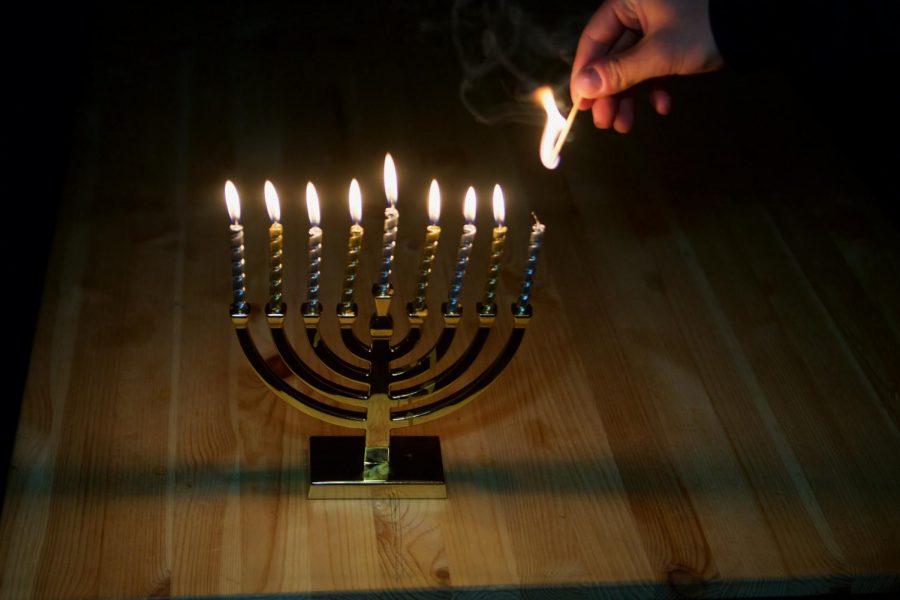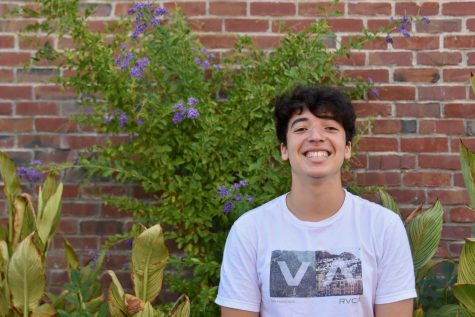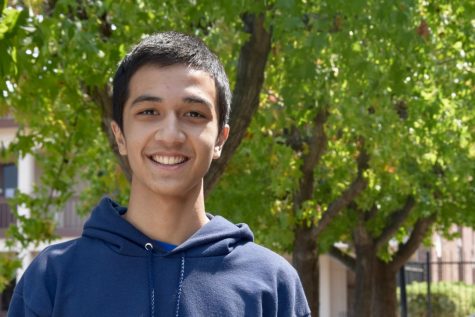Happy Hanukkah
Jewish students and teachers reflect on their experiences with Hanukkah
December 18, 2018
The young Jewish boy cannot help but contain his excitement for his favorite time of year. He grabs his mother’s CD player, and plays all his favorite Hanukkah songs that his family has been listening to for years. He notices a box filled with little square prisms nearby, and calls his two older brothers over to see who can spin these playful objects the longest. With dreidels scattered all around the living room floor, a familiar scent fills the air, and the boy quickly rises to his feet and darts to the living room, where he is greeted with a fresh batch of soft, pillowy delights filled with jelly.
From the eve of the 25th day of Kislev, the Jewish counterpart of November and December, and for eight days afterwards, the Jewish population celebrates Hanukkah. According to CNN, Hanukkah is meant to commemorate the reclaiming of the Holy Temple in Jerusalem. The menorah in the temple burned for eight days. To celebrate Hanukkah, one lights the menorah, or “hanukkiyah,” by placing a candle in a slot for each night.
For junior Dan Sachs, Hanukkah is a way to get together with friends and family. Sachs claims that the most important part for him during this time of year is maximizing the time he spends around the people he cares for most.
“It’s a pretty small tradition, and it’s not very religious,” Sachs said. “It’s a lot more [of] a celebration [of] being together, celebration of light, celebration of how fortunate we are, especially how it falls generally between November and December each year. It’s during the Thanksgiving to Christmas time, when everyone is very cheerful.”
There is not just one way to celebrate Hanukkah. Sachs describes some of his own family’s traditions, and how he and his family always manage to find the time for the holiday.
“I celebrate Hanukkah with my family, generally at home, or at our friends’ houses,” Sachs said. “There are eight nights of Hanukkah, so some days, especially if it’s a school night, we just stay at home, quickly light the candles, recite some blessings, sing some songs and then get back to our general routine.”
Much like Sachs, junior Guy Lavi has been celebrating Hanukkah for his entire life. Lavi describes one of his fondest memories from when he was a just a boy.
“One of the years, my mom made homemade jelly doughnuts,” Lavi said. “And one year, I was really hungry, and I ate like a whole dozen of them, I would say. Yeah, that’s one of my favorite memories.”
Over the years, Lavi has begun to recognize more about the Jewish culture, which has stuck with him throughout his life. Lavi shares his newfound appreciation for Hanukkah, and why he believes it is important for him and his family to carry on this tradition.
“I feel like when I was younger, the holidays were just, more fun, just like games,” Lavi said. “But now I understand the meaning behind them. And I put that into the perspective during a celebration. It’s not just like, ‘Oh yay, I get like a jelly doughnut. I get like to play with dreidels.’ Now I understand why you the light the candles, and why you use jelly doughnuts and all that stuff.”
Not only does Lavi better understand the significance behind Hanukkah, but he says he has loyalty towards his culture. Lavi has a special place in his heart for celebrating such a pivotal part of his heritage.
“Like two years ago, we went to Portland, and it was during Hanukkah, so we brought the menorah and it was freezing cold outside and I didn’t want the candle to go, so I go out, so I stood and protected the candle, while my parents and stuff were just inside the hotel,” Lavi said. “So I guess, it’s become a part of me and I take pride in it.”
A common theme for both Sachs and Lavi is the eating fried foods.
Spanish teacher Molly Guadiamos shares many of the same sentiments for these treats, like latkes and jelly doughnuts, as her holiday celebration centers more around these Jewish cultural delicacies.
“Once or twice during that week, we’ll get together with friends and have a bigger party and the big highlight is eating latkes, fried potato pancakes,” Guadiamos said. “The tradition is eating fried foods because the idea was that there was a miracle when the rebels that were holding out and not allowed to celebrate or practice their religion had taken their temple.”
While Hanukkah may have clout among the majority of Americans, it is actually one of the more minor holidays for the Jewish population, behind Passover and Kwanzaa.
“I think it’s one of the less religious holidays for Jewish people,” Sachs said. “It’s a lot more cultural, and because of that every family does it a little differently. My parents have been using the same card with the blessings for many years, so we just do it off of that standard.”
To go along with Sachs, Guadiamos also celebrates Hanukkah in a more subdued way. She treats its as more of a minor holiday, with a focus on family.
“[Hanukkah is] getting together with family and friends, and the nice thing is that it’s spread out instead of being crammed into one night,” Guadiamos said.
During Hanukkah, many people also sing to express their gratitude. There are two types os son: religious and historical. For Sachs, because he knows Hebrew, he can participate in the singing.
[Hanukkah is] getting together with family and friends, and the nice thing is that it’s spread out instead of being crammed into one night.
— Spanish teacher Molly Guadiamos
“There’s some cool stuff we do,” Sachs said. “Sometimes when there’s enough people we can do canon. So one group [sings] one part, the other group is the another part and then it builds on top of each other. That can be fun.”
On the other hand, junior Uriel Kaminitz doesn’t think of himself as too committed to Hanukkah, and does not share the same passion for the holiday like Sachs and Lavi.
“There’s a chance I’ll probably stop celebrating it, since I won’t be too dedicated to it,” Kaminitz said. “Especially if, for example, a Jewish man or woman marries someone that’s not Jewish, there’s a chance that if the person is not really committed to Hanukkah, that they’re gonna stop celebrating it. That might happen with me, but it’s not really an important holiday to me. I can see myself not celebrating it.”
However, Sachs and Lavi have differing opinions on the future of the holiday compared to Kaminitz. For Sachs, the holiday has a nostalgic meaning that would therefore lead to his continued celebration.
“Hanukkah is a celebration that I’ve grown up with, and I will do it for as long as I can,” Sachs said. “There’s no real reason why I would stop. It’s just a holiday that [has] a lot of memories, especially because it involves singing and lighting candles and I remember doing that with my siblings, even before I could actually light the candles, they helped me guide my hand and light the match and everything.”


















